

Feature Article: China's Chill Winds. Hard-core criminals are waiting as China opens its doors to international business, says Mark Craig Tens of millions of workers are set to lose their jobs in the wake of the privatisation of inefficient State owned companies.
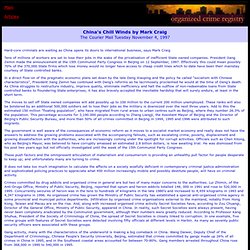
President Jiang Zemin made the announcement at the 15th Communist Party Congress in Beijing on 12 September, 1997. Effectively this could mean possibly 70% of the 370,000 State firms which lose money would no longer have access to cheap credit lines which to-date have been their mainstay courtesy of State controlled banks. In a direct flow-on of the pragmatic economic plans set down by the late Deng Xiaoping and the policy he called "socialism with Chinese characteristics", President Jiang Zemin has continued with Deng's reforms as he lacrimosely proclaimed he would at the time of Deng's death.
The moves to sell off State owned companies will add possibly up to 100 million to the current 200 million unemployed. Web. China's Greatest Threat Is Internal. Author: Richard N.
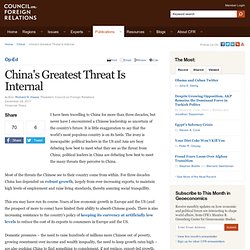
Haass, President, Council on Foreign Relations December 28, 2011 Financial Times I have been travelling to China for more than three decades, but never have I encountered a Chinese leadership so uncertain of the country's future. Eurasia Group. As we begin 2012, political risks dominate global headlines in a way we’ve not experienced in decades.
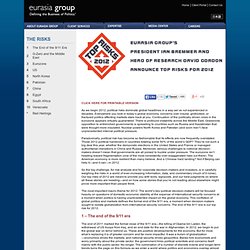
Everywhere you look in today’s global economy, concerns over insular, gridlocked, or fractured politics affecting markets stare back at you. Continuation of the politically driven crisis in the eurozone appears virtually guaranteed. There is profound instability across the Middle East. Grassroots opposition to entrenched governments is spreading to countries such as Russia and Kazakhstan that were thought more insulated. Nuclear powers North Korea and Pakistan (and soon Iran?)
Paradoxically, political risk has become so fashionable that its effects are now frequently overstated. So the big challenge, for risk analysts and for corporate decision-makers and investors, is in carefully weighing the risks in a world of ever-increasing information, data, and commentary (much of it noise). 1 – The end of the 9/11 era That’s clearest for the country that still matters most, the United States.
Asia Times Online - News from greater China; Hong Kong and Taiwan. Xinjiang and China's strategy in Central AsiaBy Stephen Blank Xinjiang, like Taiwan and neighboring Tibet, is a neuralgic issue for China, which desperately needs internal stability in that predominantly Muslim, resource-rich and strategically important region.
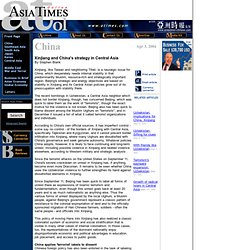
Beijing's strategic and energy objectives are based on stability in Xinjiang and its Central Asian policies grow out of its preoccupation with stability there. The recent bombings in Uzbekistan, a Central Asia neighbor which does not border Xinjiang, though, has concerned Beijing, which was quick to label them as the work of "terrorists", though the exact motive for the violence is not known. Beijing also has been quick to blame dissent among the Muslim Uighurs on "terrorists", and in December it issued a list of what it called terrorist organizations and individuals.
Since the terrorist attacks on the United States on September 11, China's severe crackdown on unrest in Xinjiang has, if anything, become even more Draconian. China's Pollution and the Threat to Domestic and Regional Stability. China's Pollution and the Threat to Domestic and Regional Stability By Nathan Nankivell China’s economic boom has an environmental dark side.
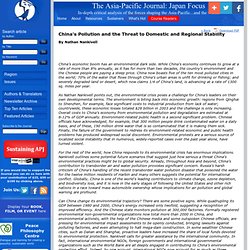
While China’s economy continues to grow at a rate of more than 8% annually, as it has for more than two decades, the country’s environment and the Chinese people are paying a steep price. China now boasts five of the ten most polluted cities in the world; 70% of the water that flows through China’s urban areas is unfit for drinking or fishing; and severely degraded land or desert, which now claims 1⁄4 of China’s land, is advancing at a rate of 1300 sq. miles per year. As Nathan Nankivell points out, the environmental crisis poses a challenge for China’s leaders on their own developmental terms. For the rest of the world, how China responds to its environmental crisis has enormous implications. China News, China Business News, Taiwan and Hong Kong News and Business. Domestic threats to China's riseBy Adam Wolfe The general consensus is that China will gradually emerge as a power in East Asia able to challenge the United States for regional dominance.
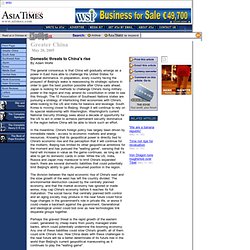
In preparation, every country facing the prospect of Beijing's wake is reassessing its strategic options in order to gain the best position possible after China sails ahead. Japan is looking for methods to challenge China's rising military power in the region and may amend its constitution in order to see this through. The 10 Association of Southeast Nations states are pursuing a strategy of interlocking their economies with China's, while looking to the US and India for balance and leverage. South Korea is moving closer to Beijing, though it will continue to rely on its special relationship with Washington.
China spends record amount targeting domestic security threats. NR/rdonlyres/0C3DA25D-C75C-4487-BC6E-2770AFA5CCE3/0/CSI2010China.pdf. China’s greatest threat is internal.